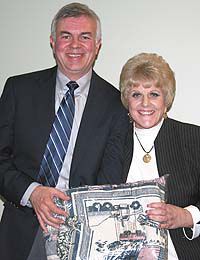| Huntington Mayor Hilary Gordon presents a Huntington afghan to Scott Matheson, chairman of the Utah State Mine Commission. She also gave a Huntington afghan to each of the commission members. The afghan contains depictions of historic buildings and events surrounding Huntington’s history. |
Mine Commission makes recommendations to Gov. Huntsman
Below is a continuation of the Utah Mine Safety Commission recommendations to Gov. Jon Huntsman and also presented to the Utah Legislature.
Recommendation: The state should support a new coal miner training program at the Western Energy Training Center that exceeds the basic curriculum and test required by the Mine Safety and Health Administration. Additional state funding support for the College of Eastern Utah should be considered to facilitate this program, and the state should request more federal funding for the MSHA States Grants program. Also, the State should provided adequate funds to the Utah Labor Commission for testing and training certifications.
WETC currently offers new miner training that meets all MSHA requirements for topical coverage, but it supplements this minimum with experienced-based learning modules in simulated mining environments based on Utah mining conditions. WETC also supplements MSHA’s online national test with a final project to increase learning retention. The Commission believes that WETC is moving in the right direction and should continue to expand and develop this approach. The funding mechanism is a limiting factor. It is based in part on the MSHA States Grants program, which provides funds to the Labor Commission that are then passed through to CEU for WETC under a memorandum of understanding. ULC and CEU have found this arrangement to be cumbersome and inadequate.
Recommendation: The State should encourage WETC to develop a continuing coal safety education program at WETC to ensure that Utah miners have the most advanced training to keep them safe. The commission recognizes that coal operators conduct on site continuing safety education for its employees. The WETC program would be designed to complement and supplement those efforts, and it should be planned and implemented in collaboration with the operators and miner representatives. Part of this training should include realistic and meaningful instruction in simulated mine environments.
Recommendation: WETC should facilitate a miner safety mentoring program that draws on the experience and expertise of current and retired miners.
Recommendation: The state should support a coal management safety training program at WETC to ensure that mine managers have the leadership and administrative skills and the latest knowledge about safety and best practices to facilitate a safe working environment in Utah coal mines. The Commission received substantial evidence on the need to develop replacements for positions at all levels of coal mining in Utah, including management positions at the mines. Training to develop management skills, including opportunities for mentoring and internships, should be provided in preparing the next corps of future managers and supervisors from the ranks of today’s mine workers.
Recommendation: The state should encourage the University of Utah Department of Mining Engineering and WETC to collaborate on engineering preparatory programs for both traditional and non-traditional students and on opportunities for teaching partnerships involving their respective faculties. The Commission heard testimony indicating there are potential benefits from collaboration between WETC and the University of Utah Department of Mining Engineering, including mini-courses offered by University faculty at WETC and practical training for University students facilitated by WETC. For example, WETC should partner with the University of Utah Department of Mining Engineering to provide short courses in such fields as ventilation engineering and electrical engineering. In addition, WETC could partner with the University of Utah Seismograph Stations to provide hands on experience with instrumentation and data collection from the seismic monitoring network proposed in the recommendation regarding seismic monitoring.
Recommendation: CEU and the Department of Mining Engineering should develop a proposal for an associate degree in mining technology for presentation to the Utah State Board of Regents. This proposal will help in the education and recruitment of needed mining engineers for Utah’s coal mines and will provide a significant educational and career opportunity for students attending CEU.
Recommendation: The board overseeing WETC should include representatives from the miners, industry, academia, and the community and should focus on developing a training program to maximize safety in Utah coal mines. The board should conduct an assessment of the training programs based on the best available performance measurement system. The US Department of Commerce, manufacturing extension partnership, offers a performance metrics system that is considered to be an effective assessment tool for the WETC program.
Recommendation: The Utah Labor Commission should continue to administer the testing and certification requirements for miners in the State of Utah. WETC and the Labor Commission should develop an effective working relationship to ensure that miner safety training and miner certification are appropriately coordinated. The testing component of the certification process should be the exclusive responsibility of the Labor Commission to protect the integrity of the certification process.
Recommendation: The Legislature should direct the Labor Commission or another appropriate entity to conduct a thorough review of coal mining certification programs in other states and seriously consider expanding the number of mining occupations that it certifies for work in Utah mines. Utah Law, Section 40-2-15 of the Utah Coal Mine Act currently requires competency certification for five coal mining positions: underground foreman, surface foreman, underground mine electrician, surface mine electrician, and fire boss. Federal regulations administered by MSHA require state certification of these positions. Other coal mining states certify other positions as well, having determined that certain responsibilities in the mines require technical knowledge and skills necessary for mining operations that involve risk of serious harm if not performed correctly.

